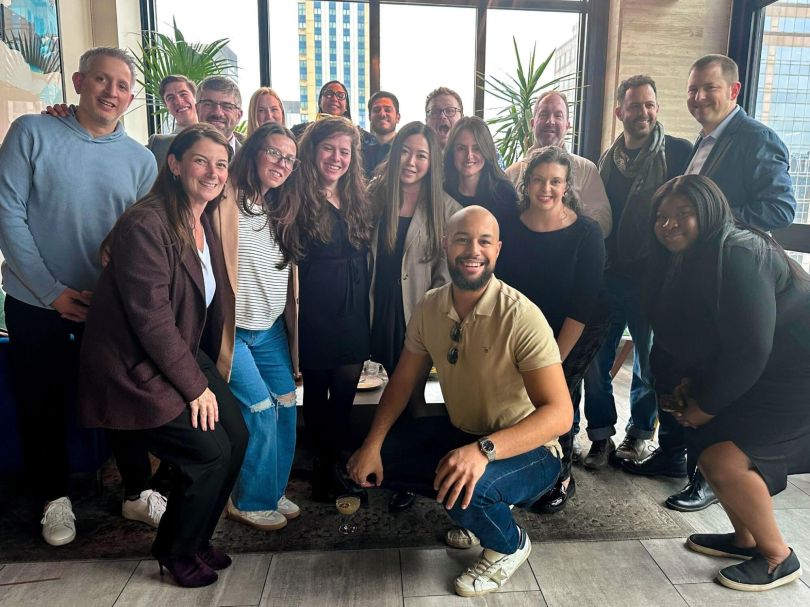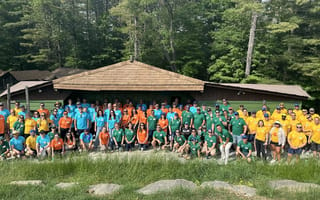Augury CEO and Co-Founder Saar Yoskovitz once said he doesn’t believe in the mythical work-life balance.
“There is only life and Augury is a part of it,” he explained during a chat with new hires. For Yoskovitz, work shouldn’t be a separate entity; rather, it should blend together seamlessly with everything else in an individual’s life.
Renewal and Growth Manager Scott Pestronk was one of those new hires who heard Yoskovitz’s impactful words. He was admittedly reluctant to believe it at first — but that changed over time.
“Four years later, I am still here, and the culture that Saar cultivates is one of the biggest reasons why,” Pestronk said.
The ethos of Augury’s culture wasn’t created by happenstance; the company was deliberately built upon a people-first mindset. People Operations Director Michal Gutelzon shared that the company recognizes that its team members are the “core” of its operations and its most valuable asset.
“Our company culture is deeply focused on creating an environment where our employees feel valued, supported and integrated into a caring community,” she said. “Every voice matters, and together, we build the future.”
About Augury
Augury’s solutions offer manufacturers AI-driven insights into the health of machines, processes and operations. These solutions are intended to help manufacturers in pharmaceuticals, consumer goods and other industries eliminate production downtime, improve process efficiency, maximize yield and reduce waste and emissions.
A Mindset Shift
Augury’s leadership team sees the workplace as an integral part of employees’ life journeys, not just a necessary pit stop on the path to fulfillment.
VP of Company Operations Amos Nachmani said that this mindset shift empowers the company’s leaders to truly support employees, urging them to go beyond a standard approach to care. He believes that this is reflected in every aspect of the organization, even in the design of its workspaces.
Nachmani helps oversee Augury’s Israel office and facilities, which have recently undergone significant renovations. He shared that the company has intentionally designed spaces that foster collaboration as well as areas that support employees’ individual needs, including a private nursing room and fully accessible restrooms.
“This project demonstrates how we approach even standard business decisions through a people-first lens,” Nachmani said. “By investing in spaces that support both professional collaboration and personal well-being, we’ve created an environment that better serves our team’s diverse needs while fostering the kind of meaningful interactions that drive our success.”
In line with this egalitarian focus, employees won’t find any designated cubicles or work stations — not even for executives. Nachmani believes that small details such as this one speak volumes about the company’s values and culture.
“This deliberate choice to maintain a flat hierarchy and foster a humble, down-to-earth environment shows that our leaders truly believe in breaking down traditional barriers between management and employees,” he said. “It creates an atmosphere where everyone, regardless of their role, feels equally valued and empowered to contribute.”
“This deliberate choice to maintain a flat hierarchy and foster a humble, down-to-earth environment shows that our leaders truly believe in breaking down traditional barriers between management and employees.”
While Augury supports its people when they’re in the office, the company is equally committed to uplifting them outside of work — especially during difficult times. Gutelzon recalled how, when a team member was affected by devastating tornadoes in Dawson, Kentucky, in 2021, the leadership team and others across the company stepped in to provide him and his family with financial and emotional support.
The same level of care occurred at a different time, she shared, when another team member needed to travel abroad to help his wife as she received medical treatment. Once again, the company’s leaders and coworkers showed unwavering support, enabling him to take the time he needed to prioritize what matters most.
For Gutelzon, moments such as these are a direct reflection of Augury’s cultural foundation; one rooted in all-encompassing care for its people.
“We genuinely care about our team members, their well-being and the challenges they may face, personally or professionally,” she said.

The ‘Common Language’ of Augury’s Culture
Some employers say work is the priority — but Augury asks, “Why work for the sake of working when you can live life instead?”
That’s why, if a direct report asked Pestronk how to finish their day, he would suggest: “Complete all your tasks, take some time to go to the gym, then focus on things outside of work.”
Gutelzon added that the company focuses more on the work itself rather than the hours put into it, empowering employees to incorporate personal needs, such as school drop-offs, into their schedules. Employees can also take advantage of four-day workweeks, which occur bimonthly, in addition to two companywide shutdowns throughout the year.
Gutelzon added that Augury focuses more on the work itself rather than the hours put into it, empowering employees to incorporate personal needs, such as school drop-offs, into their schedules.
With team members spread across various regions, the company makes an effort to foster in-person connections. Pestronk said the organization leverages Gable, a platform that helps hybrid and remote teams find nearby workspaces, to ensure team members have chances to collaborate in person within their specific region.
Of course, team members have a lot of fun, too. According to Pestronk, the company held a retreat called Camp Augury earlier this year, where more than 100 employees gathered at a lakefront camp to hike, build campfires and participate in various training sessions and workshops.
And it wasn’t just employees joining in on the festivities. Pestronk said the company’s executives participated heavily in the games and activities, and some even brought their own instruments to play.
When strung together, these cultural moments create what Nachmani calls the “common language” of Augury’s culture, offering opportunities to share experiences and deepen a sense of community.
“Ultimately, these activities and traditions aren’t just perks — they’re strategic investments in nurturing the collaborative, supportive environment that allows our people-first approach to truly thrive,” he said.

How Augury Goes All In On Growth
Augury’s people-first culture is also reflected in the ample career-growth opportunities available to employees. According to Gutelzon, many individuals have grown significantly during their time at the company, including the former chief of staff, who initially joined the organization as the head of marketing, then transitioned to a role in strategic initiatives before becoming chief of staff. Pestronk believes that this opportunity for internal growth, coupled with resources like customized development tracks and a mentorship program, enable employees to become “the best version of themselves.”
‘More Than Just a Workplace’
When Pestronk talks to others in the industry who are interested in joining Augury, his approach is always the same: “I tell people this is the best company I have ever worked for.”
In his mind, Augury’s people-first culture is a highly protected resource; one that requires the right individuals to uphold it.
“I have seen instances where a person is not contributing to the positive culture of the company, and they do not last long here,” Pestronk said.
That said, what types of individuals does the company look for when searching for new team members? When Pestronk interviews potential new hires, he shared that he looks for people who balance individual talent with a team-player mentality.
“It’s one thing to be a high-performer, but a massive differentiator for me is how you cross-collaborate with other team members and outside teams within the company,” he said.
For Gutelzon, key questions such as, “Can you share an example of a time you encountered a challenge and solved it?” and “How do you ensure everyone feels heard, comfortable and valued?” are important to ask job candidates. Because, without a sense of curiosity and a willingness to consider the needs of others, progress can never truly be achieved.
Gutelzon sees Augury’s people-first culture as the key that unlocks a myriad of things, including open communication. For instance, when an employee has a candid conversation about burnout or other issues, the company can more effectively work with them on finding solutions that will suit their needs
“Trust built through a people-first culture allows us to create a healthy, committed team focused on shared success,” Gutelzon said.
The impact of Augury’s people-first culture is clear in Gutelzon’s mind: it enables people to embrace every part of themselves to contribute to the greater good, offering a space where everyone matters — all the time.
“Augury is more than just a workplace — it’s a part of our employees’ lives,” she said.








